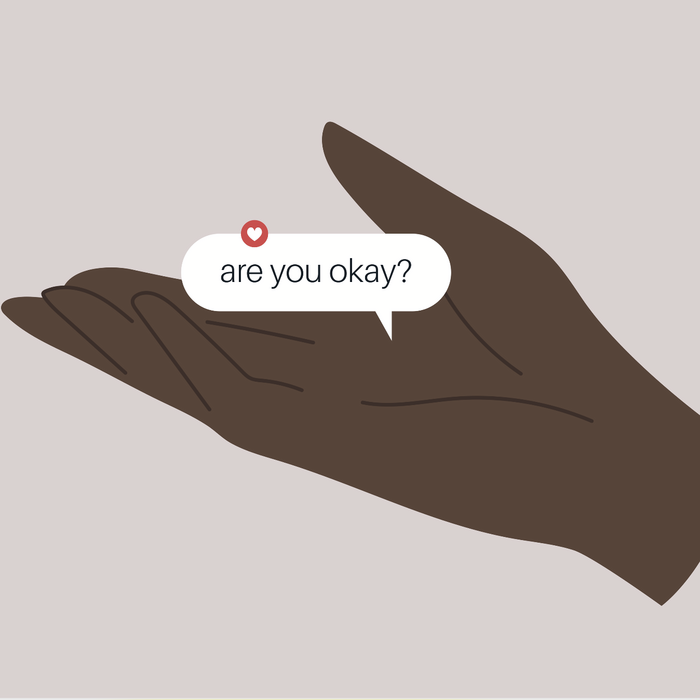When you struggle with mental health, it can be really difficult to see a light at the end of the tunnel, to feel like you have any control over your life, or to know where to go for mental health support. Friends and family may also feel powerless and uncertain how to help someone who is struggling with mental health.
Mental health support from trained mental health professionals is a crucial step to support someone struggling with mental health. These providers understand the importance of good mental health. This article will explore some practical advice to follow when someone you care about is feeling down.
How do you comfort someone who is struggling?
We know that mental health struggles can affect more than just the individuals primarily experiencing them. However, it’s important for friends and family members not to put too much pressure on themselves to solve complex issues.
Being present, showing that you care and sharing words of encouragement and strength are ways of offering good mental health support. However, heightened emotions can make it more difficult to do and say the right things under pressure. Here are some actionable tips.

What to say to someone who is struggling emotionally?
Contrary to the common expression, words actually do matter. Sharing words of encouragement for someone going through a tough time can make a true positive impact, research suggests. For example, a 2021 study determined that verbal encouragement improved individuals’ performance on a balance test for people experiencing chronic ankle instability.
If a friend or loved one tells you they are struggling with mental health, here are some phrases you can say.
- Thank you for telling me.
- You’re not alone.
- Do you want to tell me more about that?
- I’m here to listen.
- Tell me how I can help.
- If you’re not sure what to do about that, would you like my help?
If you are concerned about a friend or loved one’s mental health but they have not indicated a concern, you can lean on some mental health resources that are available in your area. You could also use some of the following language:
- I don’t mean to overstep, but I’ve noticed you may be struggling. Am I off base?
- I’m reaching out because I care and have noticed the following changes in what you say or do.
- When I was struggling with my mental health, I did or said the following. Is it possible you’re struggling?
- If you are struggling and not ready to talk about it now, I’m here to listen whenever it works for you.
- I am here for you whenever and for whatever you need.
- I know we don’t talk often, but I still care for you and have noticed you may be struggling.
The key with all these phrases is that they show compassion and acceptance without taking the control away from the person who just voiced their struggles and is likely in a vulnerable state of mind. It’s possible that friends or loved ones don’t recognize a person’s mental health struggles, so they may feel shock and guilt when an individual confides their mental health concerns.
Focus first on listening and processing their information, and do your best not to jump immediately into problem-solving or downplaying their emotions. Doing so can invalidate their feelings and make them feel like they are further losing control.
Remember, there are many community resources for mental health support that can help.

How to help someone who is struggling emotionally through actions?
Words are important when providing mental health support, but our actions and body language convey a lot of messages, too. Tone and gestures add so much context to how words are received. And even if you’re communicating through text, email or other written communication, actions can still speak volumes.
Here are some actions you can take to support someone who is struggling with their mental health.
- Listen first and offer to take action together. Offer to be a partner in your friend or loved one’s journey as you talk about the importance of good mental health. By listening silently and asking what someone needs to feel supported, you’re offering to tackle the struggle together.
- Separate symptoms from the person. No one deserves to be defined by their mental health, especially the negative symptoms that come with short- or long-term mental health issues. When talking to someone who is struggling, use “I” statements, such as “I heard the mention of suicidal thoughts. I don’t want to downplay my concerns or any potential mental health struggles by ignoring it.” You also may need to remind yourself that while frustrating and draining, negative behaviors and words are a symptom of someone’s struggles.
- Offer to help run errands, do household chores, babysit, etc. Small tasks can feel insurmountable if you’re struggling with mental health, so stepping in to help in these seemingly mundane but practical ways can help tremendously.
- Check in on a regular basis. This can be especially impactful to those who are afraid of asking for help. By checking in on a regular basis — for instance, stopping by or calling every Monday — you are letting the person struggling know that they are not alone and you have not forgotten them. Send a short message for someone going through a hard time.
What to say to a friend who is struggling with depression?
As we consider comforting friends and loved ones who are struggling with mental health, it’s crucial to talk about depression. Depression is one of the most common mental health conditions with more than 8% or 21 million Americans experiencing major depression each year.
The following are some of the warning signs for depression.
- Persistent sad, anxious or empty mood
- Hopelessness
- Being easily irritated, frustrated or angry
- Feelings of guilt, worthlessness or helplessness
- Losing interest or pleasure in hobbies and activities once enjoyed
- Lethargy
- Isolation
- Extreme changes in sleep patterns, such as insomnia or sleeping much more than usual
- Difficulty concentrating, remembering or making decisions
- Changes in appetite, weight or activity levels
- Pains, headaches, cramps or digestive problems that do not have a clear physical cause and do not go away with treatment
- Thoughts of death or suicide or suicide attempts
If you notice someone may be struggling with depression, all of the previous words and actions can help show the individual that you care and are ready to help free of judgment. Make sure you utilize some of the many mental health resources available, too.
While saying the right things and taking the proper action can be the initial step that helps someone struggling with mental health seek help, it’s important to involve trained mental health providers who can provide long-term support.
Heart of Iowa Community Services is always here to lend a compassionate and helping hand to those who are struggling. We can also walk someone who is concerned about a friend or loved one through the proper steps and actions they might take to support the person experiencing negative mental health symptoms.
Reach out at HICSIowa.org.
